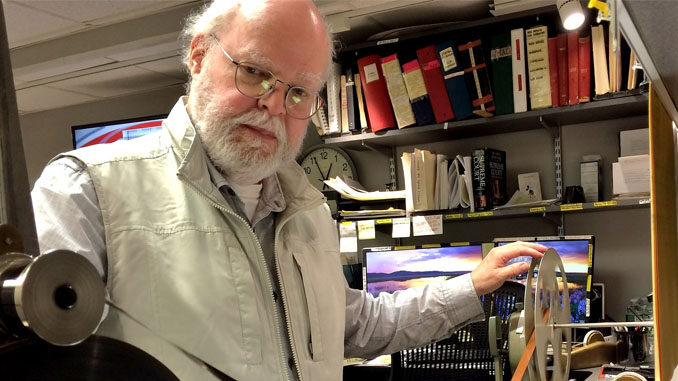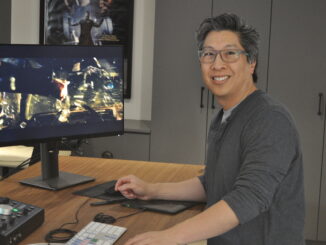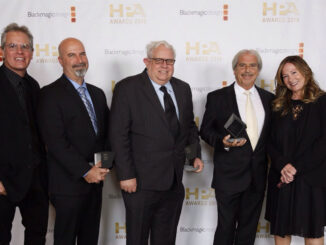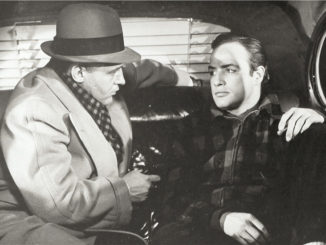
Where are you currently employed?
I’ve worked in NBC’s News Film Archive since 2005. I work freelance, which gives me a nicer contract with a better pay rate, and I still have the MPI health and pension plans. I’m a film librarian and, since 2015, I have been the “chief.”
Current Project?
Projects move quickly through the Library; it’s about days, not weeks or months. But Ken Burns’ The Vietnam War project came to us over several years. They transferred over 24 hours of our archival footage — pretty amazing. Lately we’ve had a project looking at Robert Kennedy and the events following his murder. We’ve transferred over 14 hours and there’s nothing to say we’ve finished.
Describe Your Job.
The Film Library here at 30 Rock is a front-end for the enormous archive of news film that sits across the river in New Jersey, minded by a wonderful crew of Guild members who are tasked with thousands of hours of film and zillions of hours of tapes. When someone is interested in some footage from our catalogue, they call it in and my young colleague, Chris Bell, and I prep it for screening or else we may send some material to the lab for an HD scan. “Prep” means some modest cleaning, and repair of perfs and splices, etc. We work mostly with 16mm reversal, sometimes with kinescopes and, rarely, with 35mm.
“I had been an editor since 1979 and had handled film, mostly 35mm, all the time, until the transition to digital in the mid-‘90s.”
How did you first become interested in this line of work?
When I first came to the Library, the chief was the wonderful Joyce Nakamura, who’d been there more than 25 years, and the main requirement was experience handling film. I had been an editor since 1979 and had handled film, mostly 35mm, all the time, until the transition to digital in the mid-‘90s. I worked mostly as a sound editor, handling all the tools surrounding me now: splicers, synchronizers, rewinds, cores (rarely reels). That simple handling of film is what is most deeply rewarding in my work. It was enormously appealing to be reunited with sprocketed material.
Who gave you your first break?
In 1979, my very good friend [picture editor] Peter Odabashian was assisting on a film and offered me a chance to be a sort of “night apprentice,” helping out with nighttime dailies screenings on Mike Nichols’ film of Gilda Radner’s Broadway show, Gilda Live! The job was to last only through the dailies, but once on the crew I had plenty to do until the cut was close to done. I moved over to the sound crew — and that started my career.
What was your first union job?
Gilda Live! was my first union job. In the nature of freelance life, there were many non-union jobs after that, but now I’m very glad to have been working so long in a well-managed union job, without needing to worry about pay and benefits.
Which of your credits or projects have made you the most proud and why?
I am very proud of my work as film librarian, but the job is not credit- or project-oriented; it is a matter of careful daily work. Before that, I had about 75 credits on features with most of the significant New York directors and editors from the ‘80s and ‘90s. It doesn’t matter that so few were really “good,” because the people I worked with were so talented and so driven to deliver their best work. Many were my friends, and I am terrifically proud to have been among them, crafting a substantial sheen for whatever was brought to the theatres.
What was your biggest challenge in your job (or on a particular project) and how did you overcome/solve it?
One of the major challenges in my career was the initial transition to digital sound editing. This was akin to the transition to talking pictures; people who had succeeded wonderfully were asked to confront a new way of working and were found wanting — either in the new skills or the courage to embrace new requirements. I was fascinated by the technology and eager to learn; soon I was asked to teach others and it worked out well for a while.
“One of the major challenges in my career was the initial transition to digital sound editing. This was akin to the transition to talking pictures.”
But the great promise of digital — doing the work better and doing it faster — became a choice: Do it better or do it faster. More and more jobs turned their backs on all but the faster turnout — jobs that would have brought weeks and months of work were pushed out much more quickly and the freelancer was driven to look for five or ten times the number of jobs in a year to get by, and that number of jobs wasn’t really available. Maybe I was just getting older and needed to find a steady job — one that sent me back into the analog days, with reels, splicers, synchronizers and film.
What was the most fun you’ve had at work?
Dialogue editing, especially, is often a matter of solving puzzles, and that can be a lot of fun. I worked as an ADR editor on Cider House Rules, in a big ADR department led by Gina Alfano, putting together the elements for the big snow fight in the film — a typical ADR job that took a mass of shouts from a recording session to create a small, credible, exciting scene. Sometimes a film’s badness can provide its own fun — there are opportunities in any project for a good laugh and happy satisfaction. How else could one survive decade after decade?
Jobwise, what do you hope to be doing five years from now?
I could retire at any moment; my satisfaction with the work keeps me going. If I imagine another job that might draw me away, it is in the world of film restoration, taking something that has lost its original sparkle and finding that sparkle again, without laying on top of it all the new sparkles that might have been laid on originally, but weren’t.
What are your outside activities, hobbies, passions?
I go to movies with my grown children; I play with Photoshop just to hone some digital chops; I dabble with database creation… Mostly it’s about enjoying my admirable wife, making pancakes on Sundays for my kids, and pondering my ugly dogs, who seem lovely to me.
Favorite movie(s)? Why?
I have sort of given up on favorites — there are too many; I am glad to have been able to see so very many excellent films. Lately I’ve been marveling at Pirosmani, a movie from the early ‘70s by Georgian director Giorgi Shengalaia, a lovely, thoroughly original film unavailable for 40 years, except as a PAL DVD in Europe. It’s fully ripe for restoration. Hello, Criterion?
Favorite TV program(s)? Why?
Lots of good TV. Has everybody seen the Soviet Russian series Seventeen Moments of Spring? Also The Bureau and, to be sure, anything by David Lynch.
Do you have an industry mentor?
Several people put themselves out to help me and teach me, like [sound editors] Stan Bochner and Dan Sable. But the person who most put himself forward to be my friend, advisor, boss and, certainly, mentor has been Lou Cerborino — a titan as a sound editor, whose imagination, skill, and enormous delicacy made any film he worked on professional and exciting. My career to this very moment could not have existed without him.
“I grew up thinking that being in a union was the way the worker did best.”
What advice would you offer to someone interested in pursuing your line of work?
If someone wants to get into the film business, my advice, “Don’t do it!” would surely go unheeded. With that in mind, I’d say keep track of everyone you meet and of everyone you met before even thinking about getting into the business, and never hesitate to call on them for help and advice. Sometimes successful people in the industry seem very far away from the young sloggers, but really they are people who like to talk about the work and are usually happy to help those who ask. It is a world of lucky breaks, but you can squeeze a lot of luck out of encounters with others in the field.
Was there ever a circumstance when you had to rely on the Guild for help or assistance?
I grew up thinking that being in a union was the way the worker did best. I have been fairly active in the Guild, serving in various positions on the board of the New York local and later the board of the merged local. During my first year in film, I participated in a job action to get our promised pay and the benefits we deserved. The union was there to advise and press the employer; it was often so throughout the years.
After the transition to digital, the pressures from employers to work unpaid overtime increased enormously, and there were complaints that the union was not helping as it should. The union insisted that the members had to report these pressures, while the members wanted to be protected from the pressures altogether. I was glad to escape the conundrum into a situation where I see the union doing its best to keep our wages up. Anyone who feels alone and unprotected should call the union and explain the trouble. The union is on your side.
Is there anything you’d like to say to your fellow Guild members, some words of encouragement?
Life can seem stuck at now, but really it’s a slippery affair — opportunities and challenges all along the way. There are great satisfactions in the movie crafts, but always be ready for the unexpected, keep a finger on the pulse of your passions, and be ready for what’s around the bend!
Compiled by Edward Landler
Editor’s Note: To recommend a member (including yourself) to be featured in this online column, please contact edlandler@roadrunner.com






